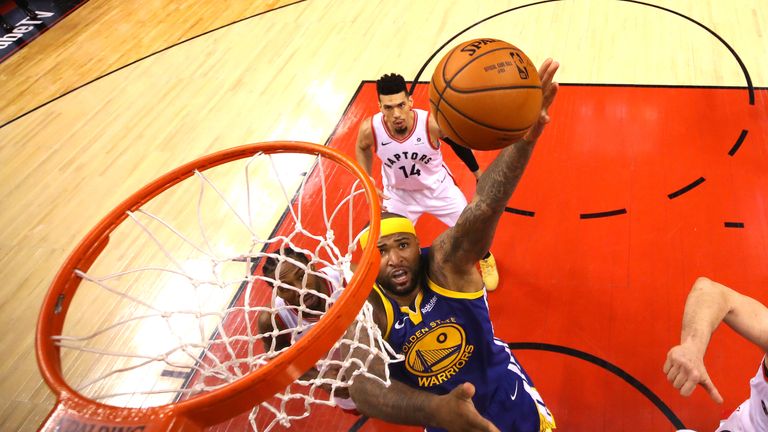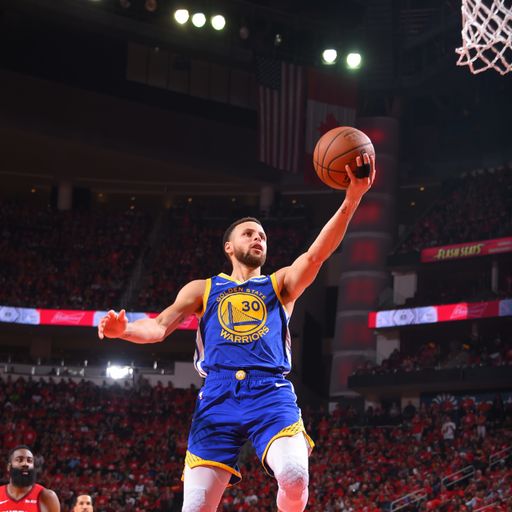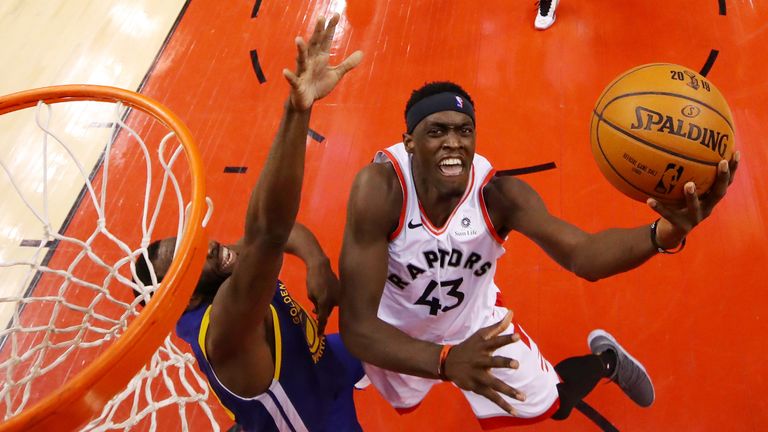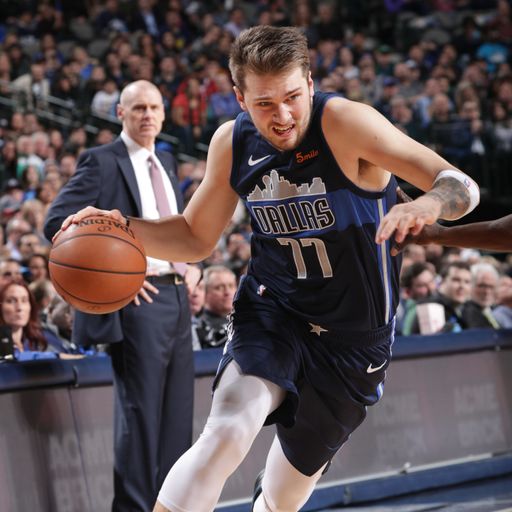DeMarcus Cousins - the Warriors' unsung hero in NBA Finals Game 2 victory
Watch Game 3 in Oakland in the early hours of Thursday morning (2am) live on Sky Sports Arena
Tuesday 4 June 2019 10:42, UK
In Game 2 of the NBA Finals DeMarcus Cousins was a surprise starter for the Golden State Warriors and Steve Kerr's gamble paid off as his team grabbed a 109-104 victory over the Toronto Raptors.
NBA expert Mark Deeks looks at how 'Boogie' was the team's unsung hero as the Warriors levelled the NBA Finals at one game apiece.
In our preview of the 2019 NBA Finals, we explored whether the respective depths of the Toronto Raptors and Golden State Warriors would be key to the outcome of the series. In game two, that certainly proved to be the case. Down by double digits in the first half - the fifth consecutive game they have been trailing at half-time - the Warriors opened with a blistering third-quarter burst to turn the game around and take the lead, a lead they would not relinquish the rest of the way.
The fact that the Warriors put on a dominant third-quarter run - specifically going on a 18-0 surge to open the half - is nothing new. Despite our earlier worries in their Western Conference semi-finals series against the Houston Rockets about whether they still had this dominant streak and the ruthlessness to change games in the third quarter like they did at the apex of their dynastic run, it would appear that they still do. And it was the efforts offered up the non-Stephen Curry/Klay Thompson parts of the roster that did it.
This is not said with reference to Draymond Green, or even Andre Iguodala. Both were good, particularly Draymond who was one rebound shy of yet another near triple-double alongside his trademark defense, yet it was beyond them that the value was. Notwithstanding the fact that Jacob Evans and Jordan Bell combined for only 13 seconds of game time, it is of note that the Warriors played 13 players in Game 2 compared to only eight for Toronto.
The Raptors have run an eight-man rotation for the duration of the entire playoffs, with very small exceptions made for Pat McCaw and Jodie Meeks in isolated games. Conversely, Golden State have for this entire five-year title window run counter to the traditional orthodoxy that prescribes rotations shortening in postseason play, and regularly go deep into their bench.
The mistakes of Game 1
Although it seemed to be a bit of a revelation for Mark Jackson on the commentary team in Game 2, it has also been noted throughout this season that this year's Warriors team is not as deep as those in the recent past. This has been particularly true offensively, where players such as Kevon Looney and Alfonzo McKinnie are finishers, not creators. The same could be said for Iguodala, Bell, Andrew Bogut, Shaun Livingston and Jonas Jerebko. Even Quinn Cook, the reserve point guard and a quality shooter, is better as an off-ball catch-and-shoot player.
The side effect of this was felt in Game 1. The Raptors - who had clearly scouted very deeply and meticulously planned how they were going to defend the Splash Brothers pairing.
They were aided in their half-court defense by the fact that the Warriors lacked for players who could help space the floor, be consistent pressure release valve options on the perimeter for Curry and Klay to pass to when blitzed, and be able to venture into the paint without constantly having to throw kick out passes, as the Raptors were preying on all these passes to get out in transition, where Pascal Siakam was unstoppable.
Having only Curry and Thompson to create off the dribble plus the transition pushes and short roll passing of Draymond, meant having fewer offensive options on the court than there were defenders. This particularly bit when either Curry or Thompson were off the court. The absence of Kevin Durant was palpable.
Of course, though, there was always Golden State's big summer acquisition to think about.
Game 1 of the finals marked DeMarcus Cousins' return to action after 42 days out with a calf injury, sustained back in the first round of the playoffs. Indeed, with him also missing the first two-thirds of the season while recovering from his torn Achilles, the Warriors have made this NBA Finals run largely without Cousins. They knew when they signed him that this would be the case, yet in spending their limited resources on him, they inhibited the options to add depth elsewhere, particularly in the backcourt.
Irrespective of how well Boogie would fit within the Curry/Thompson/Durant/Green five All-Star line-up, Cousins' acquisition and prolonged absences have very much tested the Warriors' depth and roster construction. The limitation of the Big Four model is in how difficult it can be to add the needed depth to it.
Held to only a few minutes in Game 1 due to the absences, Cousins came off the bench and for all bar a few seconds was on the court whenever Curry was not. The sight of a head coach staggering his starting point guard and backup center for offensive purposes is not something you would normally see. Steve Kerr did so however due to the aforementioned dearth of scoring whenever Curry or Klay were out of the game. In those gaps, somebody still needed to be the offensive target.
Cousins, however, was way off the pace in that first game. So the announcement that he would start Game 2 drew some intrigue.
It is true that Bell had not done anything of note during his spot start in Game 1, yet to play Cousins over Looney - an excellent role player whose paint-based game complements the guard pairing and who seemingly never needs touches offensively - seemed a gamble too far. After all, how many minutes could Cousins handle given that he is far from in game shape?
Cousins' impact in Game 2
It turns out that the answer to that question is 27 minutes and 37 seconds. That is how long Cousins played in Game 2 and he had a joint team-high +12 net rating in that time.
Built like a shipping container and willing to use all that strength, Cousins played Marc Gasol physically in a way that Bell and Jerebko cannot, and that Green and Looney, if they are to stay out of foul trouble, should not. More importantly, he became the handling and scoring option to relieve the pressure on the Splash Brothers that the Warriors needed.
For years, the question around Cousins was whether, despite of all his talents and his massive frame, he could ever be the kind of player a winning team could be based around, having never made the playoffs before in eight years. Considering his poor defensive instincts and excessive desire to be a skill-based player rather than a power-based one, the answer has been no. But that matters not now. Cousins did not join the Warriors to be the foundation. He came to be the ultimate mid-season reinforcement.
With all the line-up adjustments the Warriors have had to make, the crispness of execution can thus sometimes lack, particularly defensively, where in the first half, far too many Raptors shooters were left often. Cousins was often a part of that. He has never been a good team defender or a player with close-out speed and against this well-honed short Raptors rotation, they were made to pay for that.
However, he earned it back on the other end. In addition to playing physically and being a part of why so many key Raptors players were hindered by foul trouble, Cousins also used his excellent passing vision to hit cutters and open up the playbook. The Warriors' 18-0 third-quarter run came about from playing downhill more, getting out at a faster pace, and getting to the rim in a way they could not do so in Game 1, all of which were availed by his versatility.
Toronto have very much figured out their strategy for slowing Curry out on the perimeter, attempting to dribble over screens. Yet a different defense is required when the screener or the kick-out recipient can find a cutting guard themselves. Everyone's movement matters more, and no longer can the front line of the offense be swamped by defenders. Now, the entire half-court needs defending. And it is Cousins' presence both near and away from the basket that opened that up.
There is an awkwardness innate with Cousins due to his defensive deficiencies and his offensive insecurities and an unreliability that comes with that. But those are bigger problems when viewed through the lens of being 'the guy'. That no longer matters. Right now, Cousins is an important fourth wheel, and last night, he reminded us that he is really good.
Game 3 takes place in Oakland in the early hours of Thursday morning (2am) live on Sky Sports Arena.










